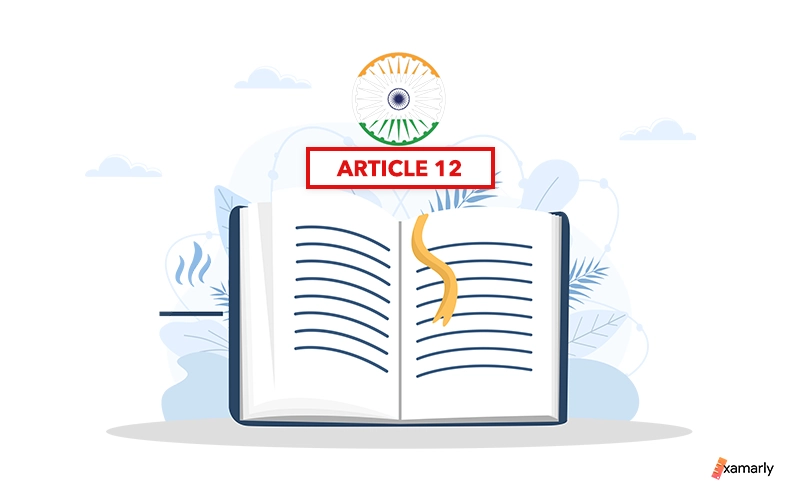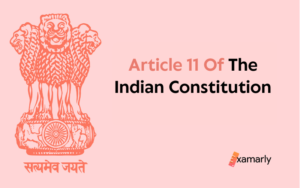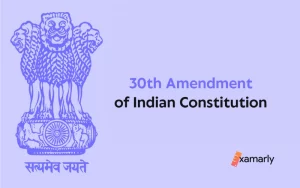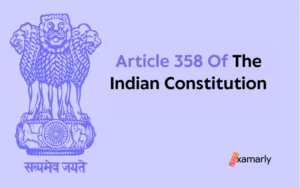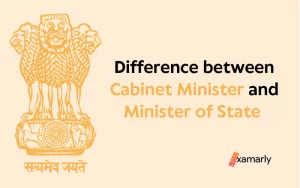The Indian Constitution guarantees equality before the law. This means that no person is entitled to discriminate against another citizen on grounds of race, religion, sex, or place of birth. This rule has no exceptions. However, it is important to note that the governing body that preserves these human rights is notably mentioned in the constitution as ‘the state’. This is where Article 12 of Indian Constitution establishes its relevance. It does the tedious task of defining what is a state thereby bestowing clarity to further Articles of the Indian Constitution.
In this piece of writing, we will look at the authority of government in provisions related to this foundation of freedom and how Article 12 of Indian Constitution gives meaning to the state. The importance of Article 12 and the most recent events pertaining to it will be briefly discussed in this article. This information is crucial for the Indian Polity (GS-II) syllabus of the IAS Exam.
Part III & Article 12 Of Indian Constitution
The Indian Constitution has various definitions of a ‘state’. For example, a ‘state’ can be a statutory body or an entity that is under the government’s control. In simpler terms, the government exerts some form of control over the body in question. While this definition is not universal, it does apply to bodies that are not explicitly governed by the government. The aforementioned control can be financial, administrative, and functional and becomes evident through the government’s exercise of power over the body. Any statutory and non-statutory body becomes recognizable as a ‘state’ when they attain financial support from the government, for which the government exerts pervasive control over the whole thing. The Delhi Transport Corporation, for example, is a statutory body. However, it is not subject to the same definition as the NCERT, which functions as a non-governmental body catering to education.
Constitution of India’s Part III recognizes the foundational rights of its citizens. These rights are set forth by the definitions of the state. In Article 12 of Indian Constitution, it is stated that the state is defined as an authority that has the sovereign function to protect the fundamental rights of its citizens. In other words, a state is defined as an institution that has the power and responsibility to provide certain services to citizens. Similarly, any government body that possesses powers to regulate a country’s laws must respect these rights which are foundational for a democratic society like India. This is where how the state is defined in Article 12 helps in controlling unchecked power.
In other words, a state may not make laws that abridge the fundamental rights of its citizens. A law enacted before the commencement of the current constitution is invalid. Any laws enacted before the constitution came into effect are invalid. Therefore, laws that infringe upon these rights must be amended to reflect these changes. So, what exactly are the plans of Article 12 of Indian Constitution? Let us examine them one by one to gain a better understanding of what constitutes a state.
Definition Of State Under Article 12 Of Indian Constitution
The state is defined in Article 12 of Indian Constitution as the categories given below:
- State Government’s Legislative as well as Executive Organs
- State Governments
- State Legislature – Legislative Council of State and Legislative Assembly
- Union Government’s Executive and Legislative Organs
- Indian Government
- Parliament of India – Rajya Sabha and Lok Sabha,
- All local authorities/ bodies
- Panchayats – Zila Panchayats, Mandal Panchayats, Gram Panchayats
- Municipalities – Municipal Corporations, Nagar Palika, Nagar Panchayats
- Improvement Trusts
- District Boards, etc.
- Any statutory and non-statutory body becomes recognizable as a ‘state’ when they attain financial support from the government, for which the government exerts pervasive control over the whole thing. The Delhi Transport Corporation, for example, is a statutory body. However, it is not subject to the same definition as the NCERT, which functions as a non-governmental body catering to education.
Examples of Non-Statutory Authorities are:
- Central Vigilance Commission
- Lokpal and Lokayuktas
- Central Bureau of Investigation
Examples of Statutory Authorities are:
- National Human Rights Commission
- National Consumer Disputes Redressal Commission
- National Law Commission
- National Commission for Women
- National Green Tribunal
- Armed Forces Tribunal
It should be noted that private bodies are not defined as ‘state’ as per Article 12.
To Know about the powers and functions of Rajya Sabha and Lok sabha, click on the linked text.
Article 12 Of The Indian Constitution Defines ‘Other Authorities’
Article 12 defines “Other Authorities” as “any such authorities that lie within India’s territory and are controlled by the Indian government through its acts and amendments.” ‘Other authorities’ is also used to denote all constitutional or statutory authorities that have been bestowed with agency and authority for promoting economic activities. Here, the term is not limited to the statutory corporations alone. It also encompasses government companies, registered societies, or bodies that have some nexus with the government.
- Ujjain Bai v. State of Uttar Pradesh (UP) – The Supreme Court noted that Article 12 concludes authorities’ list included by the definition by mentioning “other authorities” operating inside India’s territory, which cannot be understood as “of or of the same sort” as the Government, Legislature, or local governments. This called into question the power of courts. In this case, pertaining to Sales Tax, the higher court’s authority to dismantle the sayings in the lower court highlighted the case of judicial review.
- R.D Shetty v. Airport Authority of India – Justice P.N. Bhagwati proposed five elements to determine if the ‘body’ in the news is necessary to be designated the ‘State’ as per Article 12 or is it the other way:
- If the Indian Government owns the share capital of the ‘Body’ entirely, it can be called a ‘State.’
- Other authorities of this nature have a governmental function.
- The government has exclusive control over such authorities.
- These authorities have a command or authority element to them.
- The authorities performing public service.
- Electricity Board, Rajasthan v. Mohan Lal In the case presented by Mohan Lal, the question of equal treatment of workers as guaranteed by Articles 14 and 16 was called into question. It also brought up the question of authorities as per Article 12. The Supreme Court ruled that “other authorities” include all authorities whose powers are conferred by law under the Constitution or statute.
Does “State” Comprise The Judiciary?
Judiciary is not clearly specified as a ‘state’ in the Constitution. Courts have their own administrative function wherein instances have occurred where administrative decisions pronounced in courts have been called out as antagonistic to a citizen’s fundamental rights. This is a matter of judicial and non-judicial functions. However, the Supreme Court has interpreted its findings on the scope of power for the judiciary to pronounce judicial decisions in numerous cases.
- In Ujjain Bai v. the State of UP, the Supreme Court ruled that an appeal can only challenge the error of law or fact made by a quasi-judicial authority. It brought into attention the fact that to become a state a body should have a certain amount of governmental control over it in terms of authority, functionality, and economic dependency.
- Taking into account the Supreme Court’s power under Article 145 of the constitution, the Supreme Court concluded that the rules it made under Article 145 were exercising a power of delegation and that the power could not harm basic rights and human dignity.
Key Terms
Legislative And Executive Union
As per Article 12 of the Indian Constitution, both the legislative and executive branches of the Union Government are defined as states. Let us look at the government’s control over citizens in both these cases.
1)The two houses of the parliament of India, namely the Lok Sabha and the Rajya Sabha constituted what is called the Union’s Legislative wing.
If a law is passed by the Parliament that does not promote the freedom of its citizens as guaranteed by the Constitution’s Part III and hinders the fundamental rights promised, then it is possible to sue the state in the Indian Constitutional Court.
2) In the Union, the Executive is represented by the Central Government of India, which includes the President, the Prime Minister, and all other Ministries and Departments.
Article 12 of the Constitution allows the central government to be sued if it undertakes actions that breach basic rights. The President’s “Ordinance” can be challenged against the state if it is incompatible with fundamental rights.
State Government And Legislature
Definition of the term ‘State’ in Article 12 comprises the State government’s executive branches and legislative. To make sure that the state itself does not cause any discrimination against any classes of citizens, constitutional protection is necessary for the actions of the state itself.
- For example, here are two of a state’s legislative organs – the Legislative Council and the State Legislative Assembly. In the event that a law is passed by the legislative assembly that violates the fundamental freedoms guaranteed by Part III of the Constitution, the State can be sued in the High Court or Supreme Court.
- As the executive organ of a state inside the territory of India, the State Government consists of the Governor, Chief Minister, and all other ministries and departments. Under Article 12 of the Constitution, one can sue the state government for violating the human rights of any class of citizens.
- An ordinance that violates fundamental rights can be challenged by taking into account the characterization of the state.
Other Important Terms
The Territory Of India
Article 1 (3) of the Indian Constitution clearly defines what constitutes India’s territory. Accordingly, it comprises:
- The Union territories mentioned in the First Schedule
- The territories of the States; and
- Such other territories may be acquired.
Local Authorities
The Supreme Court has interpreted local authorities in numerous case laws and has developed guidelines to determine whether local authorities are legitimate as a definition of state under Article 12. In this definition, “local authority” is defined as Section 3 (31) of the General Clauses Act of 1897. Thus, within the term’s meaning, a Panchayat, a Port Trust, a Municipal Committee, and Municipality is a “State”.
Conclusion
Part III of the Indian constitution deals with the fundamental rights of a citizen. These advocate for social rights, cultural rights, and economic rights including the freedom of speech, expression, thought, belief, livelihood, opportunity, faith, and worship. Article 12 becomes relevant when looking into who or what comprises the “state” that must uphold these inalienable rights. This definition of a ‘state’ is crucial. That being said, it exists to ease the application of provisions as per Part III of the Indian Constitution. This means that even if a body is not specifically introduced as a ‘state’ under Article 12, in scenarios where these public bodies have a public duty to perform which is controlled by State of public officials, they may end up being considered as a state. A writ below Article 226 may also lie in opposition to it on non-constitutional grounds or grounds of contravention of a few provisions of the Constitution outside Part III.
FAQ
Q1. Is Article 12 A Fundamental Right?
Technically, Article 12 does not function as a fundamental right. However, it serves the purpose of defining the term state. This definition becomes significant to the fundamental rights given in Part III of the constitution or specifically as enshrined in Article 14-35. The state’s definition in Article 12 provides agential clarity on the authority and responsibility for upholding fundamental rights.
Q2. Under Article 12, What Is Not A State?
Anybody that is administratively, financially, and functionally headed and run by the government becomes what Article 12 refers to as the state. So, anybody that is merely regulated by the government is not a state. That being said, we cannot fully depend on what is specifically mentioned as a state. What is and what is not a state has been openly debated and disputed in court.
Q3. Is BCCI A State Under Article 12?
This question gained attention during the IPL spot-fixing case. During the proceedings, it was declared that the Board of Control for Cricket in India, a provisional board that represents cricket in India, was not a state. In simpler terms, the body that governs and oversees cricket with its own funds is autonomous. Thus, BCCI is a non-state entity under writ jurisdiction as per Article 226 of the Indian Constitution.
Q4. Is UNO A State?
UNO is neither a state nor a government. The Sanjaya Bahel v. Union of India & Others case brought to attention the verdict that the United Nations Organization is, under Article 12 of the Indian Constitution, not a state. The case discussed the question of the immunity enjoyed by United Nations Organizations (UNO) under the United Nations (Privileges and Immunities) Act, 1947. Henceforth, it was declared by the Delhi High Court in May 2019 that UNO is not a ‘State’ defined under Article 12 of the Indian Constitution and hence it is not within the jurisdiction of India to intervene.


